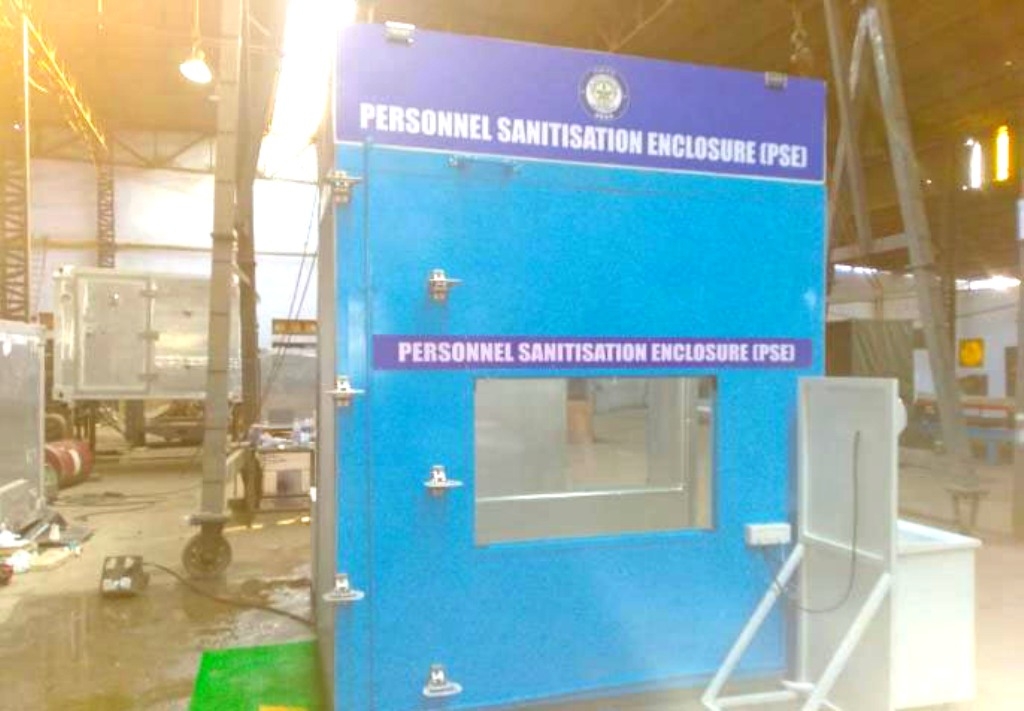
By Raju Vernekar
Mumbai, April 6
Defence Research and Development Organisation (DRDO)’s laboratory- Vehicle Research and Development Establishment (VRDE), located at Ahmednagar in Maharashtra, has designed a full-body disinfection chamber called Personnel Sanitization Enclosure, for personnel decontamination.
This walkthrough enclosure is designed for personnel decontamination, one person at a time. This is a portable system equipped with sanitizers and soap dispenser. The decontamination is started using a foot pedal at the entry. Upon entering the chamber, an electrically operated pump creates a disinfectant mist of hypo sodium chloride for disinfecting. The mist spray is calibrated for the operation of 25 secs and stops automatically indicating the completion of the operation.
As per the procedure, personnel undergoing disinfection will need to keep their eyes closed while inside the chamber. Approximately 650 personnel can pass through the chamber for disinfection until a refill is required. The system has seen-through glass panels on sidewalls for monitoring purposes and is fitted with lights for illumination during night time operations. A separate operator cabin is provided to monitor overall operations.
The system has been manufactured with the help of M/s Dass Hitachi Ltd, Ghaziabad, within a time span of four days. This system can be used for the disinfection of personnel in the areas of controlled ingress and egress such as entry and exit to hospitals, malls, office buildings, and critical installations.
Besides, sanitisation chamber, DRDO’s laboratory “ Research Centre Imarat (RCI)” Hyderabad and its another laboratory-” Terminal Ballistics Research Laboratory”, (TBRL) Chandigarh, have developed face protection masks for health care professionals handling the Covid-19 patients. Its lightweight makes it convenient for comfortable wear for long durations. This design uses commonly available A4 size Over-Head Projection (OHP) film for face protection.
The holding frame is manufactured using Fused Deposition Modeling (3D printing). The poly lactic acid filament is used for 3D printing of the frame. This thermoplastic is derived from renewable resources such as corn starch or sugarcane and is biodegradable. The face mask will be mass-produced using an injection moulding technique for volume production.
A hundred face shields are being produced daily in TBRL and provided to Postgraduate Institute of Medical Education and Research (PGIMER) Chandigarh. Similarly, 100 are produced at RCI and have been handed over to ESIC, Hyderabad. Demand for 10,000 Nos. has been received from PGIMER and ESIC Hospitals based on the successful user trials.
In another development, the Defence Ministry has stated that the HLL Lifecare Limited (formerly Hindustan Latex Limited), the nodal agency appointed by the Indian government for centralised procurement, has already started the production of hand sanitiser as per the WHO standards in the factories of the Ordnance Factory Board (OFB).
While in the first phase, 1,500 litres of sanitizer was sent on March 31 from Cordite Factory Aruvankadu (Tamil Nadu), Two more factories, namely Ordnance Factory (OF) in Itarsi, Madhya Pradesh and Ordnance Factory Bhandara (OFB) in Maharashtra are ready with bulk production. Together, they have the capacity to produce 3,000 litres of sanitizer per day to meet the national requirement.
Apart from sanitizers, the Ordnance Equipment Factories at Kanpur, Shahjahanpur, Hazratpur (Firozabad) and Chennai are engaged in developing coverall and masks. The management in these factories has also arranged special heat sealing machines for the manufacture of these products at very short notice. The first samples of the coveralls have already been tested at the DRDO, Gwalior, Madhya Pradesh. The OFB will soon commence bulk production of coveralls up to 5,000 to 6,000 pieces per week.
Meanwhile, Bharat Electronics Limited (BEL) has began production of 30,000 ventilators for ICUs. The design of these ventilators was originally developed by DRDO, which was improved upon by Skanray, Mysore, with whom BEL has collaborated. Besides the Ordnance Factory, Medak (Telangana) has undertaken repair of ventilators in various hospitals in Hyderabad. Apart from this, the OFB has also planned 280 isolation beds across 10 hospitals spread over six states in the country. They are located at Ammunition Factory Khadki (Maharashtra), Vehicle Factory Jabalpur, Metal and Steel Factory Ishapore (West Bengal), Gun and Shell Factory Cossipore (West Bengal), Ordnance Factory Kanpur (Uttar Pradesh), Ordnance Factory Khamaria, Heavy Vehicle Factory Avadi (Tamil Nadu) and Ordnance Factory Medak (Telangana).
Besides Hindustan Aeronautics Limited (HAL) in Bengaluru, too, has come up with the isolation ward facility with three beds in the Intensive Care Unit and 30 beds in wards. In addition, a building with 30 rooms has been readied. In all, 93 persons can be accommodated at the HAL facility. Earlier, the OFB had manufactured and dispatched 50 specialised tents for coronavirus patients to the Arunachal Pradesh government at a short notice.
In the meanwhile the number of active Covid 19 cases in Maharashtra has climbed to 748 with 45 deaths. While 56 patients have been cured and discharged.



